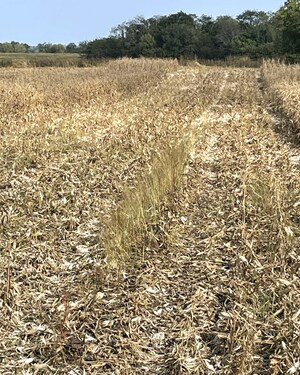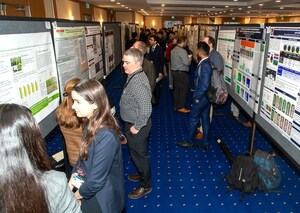
Broadleaf crops weed survey shows little change from worst weeds identified in 2022
WESTMINSTER, Colo., Nov. 25, 2025 /PRNewswire/ -- Results from the 2025 Weed Science Society of America (WSSA) broadleaf crops weed survey highlight the need for new herbicides and alternative weed management strategies. Those needs were revealed by comparing WSSA's 2025 survey results with those obtained in 2022.
"Producers have continued to rely on the same herbicide chemistries for years to control problematic weeds," says Matthew 'Cole' Woolard, Ph.D., WSSA Science Policy Fellow and Texas Tech University graduate assistant, who helped compile the survey results, along with Aleah-Butler Jones, WSSA Science Policy Fellow, a fourth-year Ph.D. candidate in horticultural biology at Cornell University. "Numerous weeds, such as Palmer amaranth, waterhemp, and kochia, have evolved resistance to herbicides that crop producers continue to rely on for weed control."
WSSA's Executive Director of Science Policy, Lee Van Wychen, coordinates WSSA's weed survey every year. He distributed the 2025 online survey to all the members of the WSSA and its member affiliates in the U.S. and Canada, collecting responses during July and August 2025. Member affiliates include those from the Aquatic Plant Management Society (APMS); Canadian Weed Science Society (CWSS); North Central Weed Science Society (NCWSS); Northeastern Weed Science Society (NEWSS); Southern Weed Science Society (SWSS); and Western Society of Weed Science (WSWS).
"The 2025 survey results mirror the 2022 survey, indicating that we have not yet found any new weed management strategies that are effective on our most problematic and common weeds," concludes Woolard. "These latest results are important for our researchers and farmers, because our key broadleaf crop weeds – pigweed species, common lambsquarters, kochia – remain problematic in fields."
In WSSA's 2025 survey, 347 members in 42 of the 50 U.S. states and seven of the Canadian provinces provided input. "This year's responses also highlight our need for alternative herbicide chemistry or management strategies for the weeds that continue to be problematic annually," emphasizes Woolard. "The weeds that continue to be the most common and most troublesome have evolved resistance or have limited control options. Therefore, we need to continue looking for alternative weed management strategies to fortify our conventional practices to control weeds."
Researchers across North America are evaluating new technologies such as weed zappers, harvest weed-seed management products, weed flamers, and cover crops, among others, as tools that could be integrated into season-long weed management systems, notes Woolard. If these options prove viable, it will give producers additional tools to the current chemical options for weed control, he says.
The main results from the 2025 survey are as follows:
- The most common weeds among the 13 crops evaluated remain almost identical to the 2022 survey. The ranking of the weeds may have shifted slightly; however, nine of the top 10 remained the same: common lambsquarters, Palmer amaranth, kochia, waterhemp, redroot pigweed, nutsedge species, morningglory species, horseweed (marestail), and common ragweed.
- A similar trend was observed for the most troublesome weeds. Of the weeds listed, eight out of 10 were identical between the 2022 and 2025 surveys. They are Palmer amaranth, kochia, common lambsquarters, nutsedge species, waterhemp, horseweed (marestail), common ragweed, and morningglory species.
- For soybeans, waterhemp surpassed Palmer amaranth as the most problematic weed.
- Hemp was added to the 2025 survey for the first time, providing a total of 13 crops compared to 12 in the 2022 survey. Pigweed species also ranked among the most common and troublesome weeds for this crop.
- Finally, a surprising number of volunteer crops were identified as common and troublesome weeds in this survey. While the frequency was not high enough to rank among the top five most common and troublesome weeds for any crop, this is a trend worth monitoring to see whether volunteer crop management becomes a more challenging weed problem in the future.
"We would like to thank all the member respondents for filling out the 2025 Most Common and Troublesome Weeds survey," says Woolard. "These surveys help to provide milestones for weed management success and failure and to track weed population shifts over longer periods of time. It's vital to continue this resource for future years."
To learn more about WSSA and its annual surveys, visit: https://wssa.net/weed/surveys/. For more information about WSSA's 2025 broadleaf crops survey, visit this Excel link: https://wssa.net/wp-content/uploads/2025-Weed-Survey_Broadleaf-crops_pivotV1.xlsx, or this PowerPoint link that summarizes the top five most common and troublesome weeds for each crop: https://wssa.net/wp-content/uploads/2025-Broadleaf-Crops-Survey-Results.11.5.25.pptx.
About the Weed Science Society of America
The Weed Science Society of America is a nonprofit scientific society, founded in 1956 to encourage and facilitate the development of knowledge concerning weeds and their impact on the environment. The Society promotes research, education and extension outreach activities related to weeds, provides science-based information to the public and policy makers, fosters awareness of weeds and their impact on managed and natural ecosystems, and strengthens cooperation among weed science organizations across the nation and around the world. For more information, visit www.wssa.net.
SOURCE Weed Science Society of America






Share this article